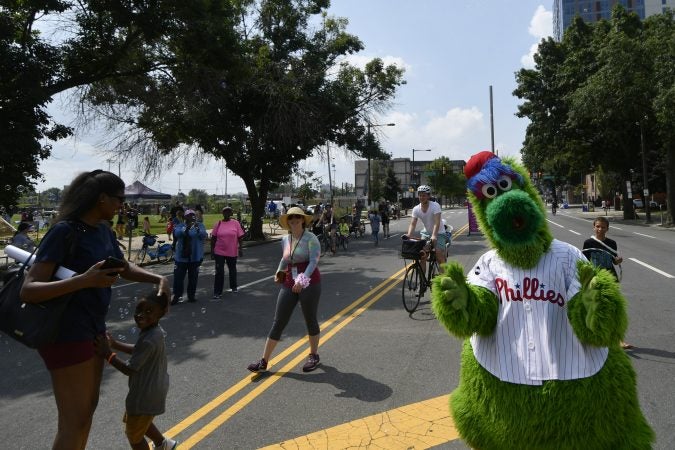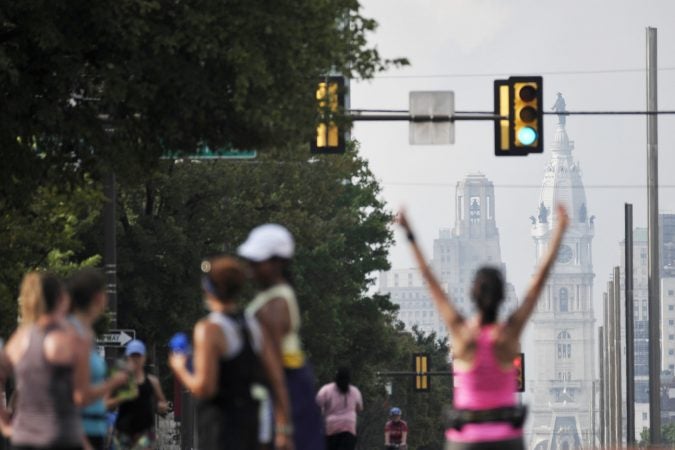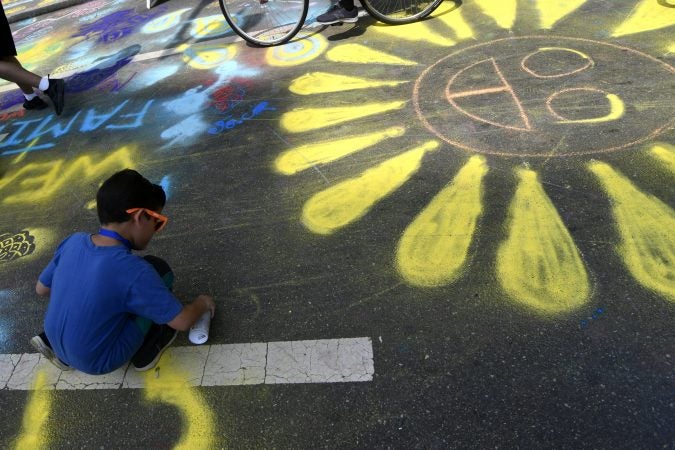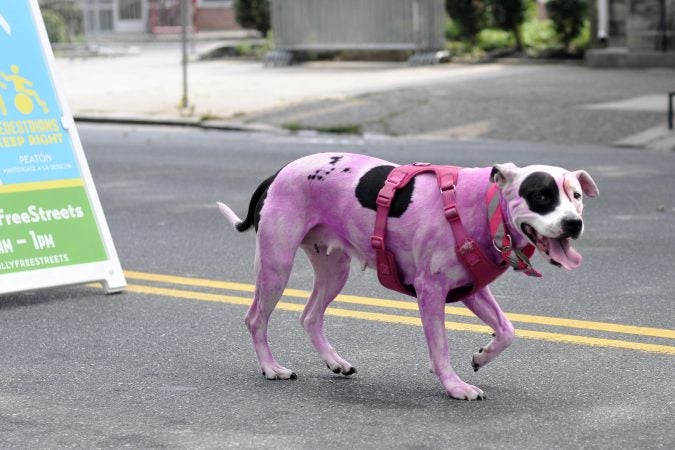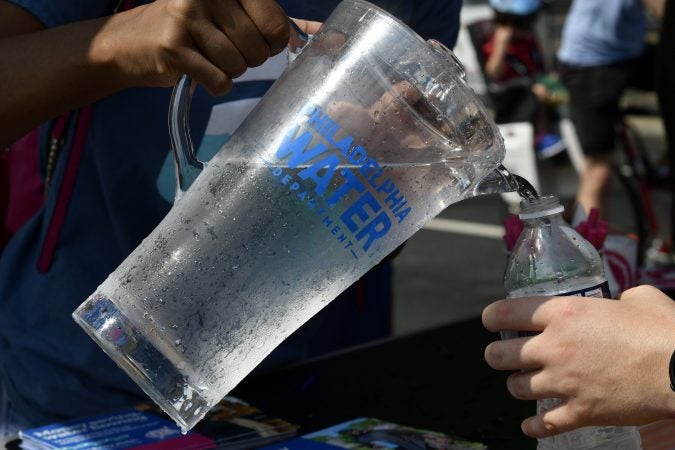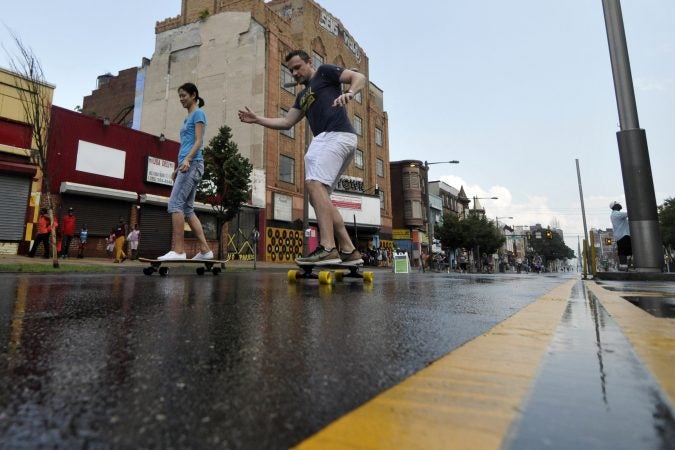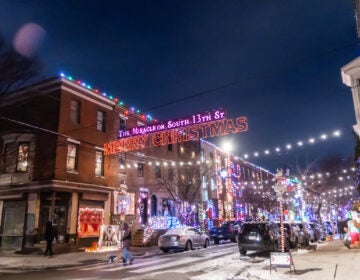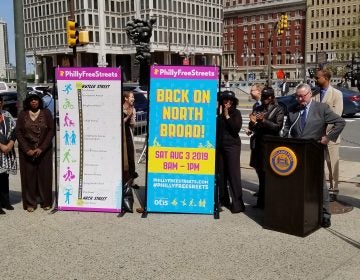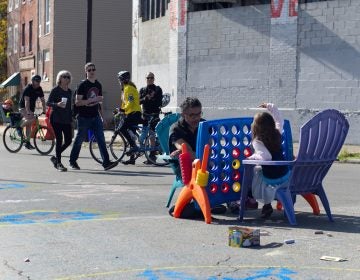In its second year on North Broad, Philly Free Streets boosts historic North Philly institutions
For some African-American cultural institutions based on North Broad Street, programs like Philly Free Streets give them a chance to elevate their work.
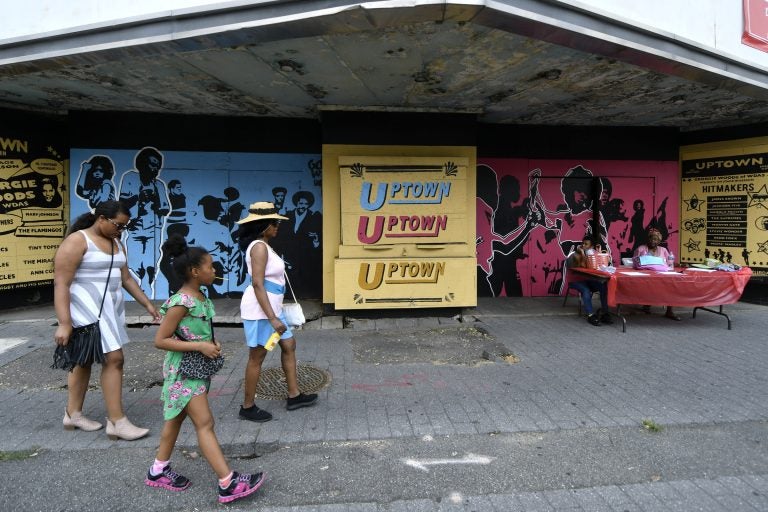
People walk past the Uptown Theater on the 2200 block of North Broad Street. Visitors had the chance to see the theater from the inside during the annual Philly Free Streets event. (Bastiaan Slabbers for WHYY)
Eight-year-old Jerrell Williams got to spend a Saturday in the summer beachside while playing a match of giant Connect Four with his grandfather, Ed Walker.
“I like the sand and the beach ball and riding my bike out here,” Williams said. “And it feels like my life is free.”
Half of a block at Broad and Master streets became a sandy city beach scene, with many of the amenities you’d find at the Jersey Shore — hammocks, sandcastles, beach umbrellas, and inflatable pool toys.
Beach on Broad was part of Philly Free Streets. In its second year on North Broad Street, the thoroughfare went car-free between Arch Street and Germantown Avenue. Minus the usual traffic congestion, thousands of people took to the street, on bikes, scooters or on foot.
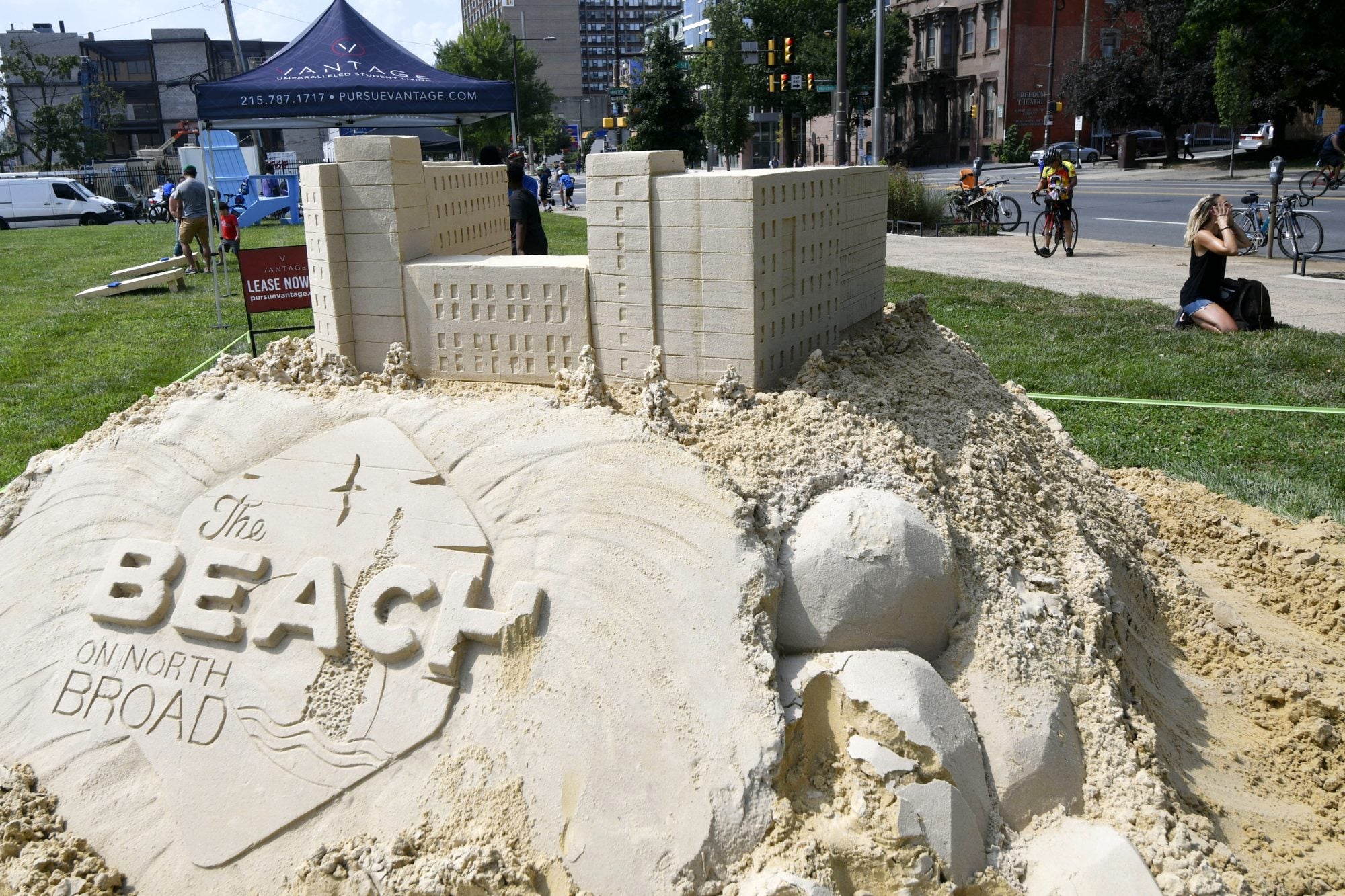
Community programming spanned many of the neighborhoods along the North Broad Street corridor — from North Central Philadelphia by Temple University to the Fairmount-Poplar section, which boasts new developments, including a revamp of the Divine Lorraine Hotel and The Met Philadelphia concert venue.
This comes at a time when more sections of North Broad Street are experiencing rapid new construction and economic development. The North Broad Renaissance, a nonprofit that serves as a special services district for the corridor in North Philly, was founded in 2016 to revitalize four miles of Broad Street — from City Hall to Germantown Avenue.
And for some of the historic African-American cultural institutions along North Broad Street, community engagement opportunities like Philly Free Streets give them a chance to promote their organizations’ work to the community.
Mable Welborn is the owner and manager of the Leon H. Sullivan Services Center, where the Beach on Broad event took place. Beach on Broad was hosted by The Goldenberg Group and North Broad Renaissance. The center is home to social and human service providers in North Philly and across the city and is named for Leon Sullivan — a prominent Baptist minister and civil rights leader who opened the country’s first African-American-owned and developed shopping center at Broad and Oxford streets in 1968. Sullivan Progress Plaza still stands today with businesses like Fresh Grocer, Sherwin Williams, and the headquarters of State Rep. Malcolm Kenyatta.
With Beach on Broad in its second year on the center’s lawn, Welborn said Free Streets highlights the history of North Broad Street.
“I don’t think there’s any other place in the city of Philadelphia and maybe some other cities beyond that there are three blocks on a major street that house operations and institutions that were started and are still operated by African-Americans,” Welborn said. “That’s the significance of this to us.”
And she says the beach space is also a boost for neighborhood kids.
“That’s one of the beauties of this because there are probably some children here that will never go to a beach any place, but they will have an opportunity here to enjoy the sun and the sand right here on Broad Street,” Welborn said.
However, she is concerned about some of the development in North Philadelphia.
“I’ve been here on Broad Street one way or another with the Sullivan organization since 1966, Welborn said. “We are concerned that whatever happens on North Broad, that it is not a community deportation, if you would.”
“Whatever happens, I want to make sure it benefits the people who live in this general area, that it benefits them by offering them jobs and it does not displace them when it comes to housing, so whatever is happening along here, it needs to be affordable,” she added.
Uptown Theater opens its doors for Free Streets
This year, North Philly’s Uptown Theater — an Art Deco style theater near Broad and Dauphin streets, celebrated 90 years since it first opened its doors. Since ending its rhythm-and-blues performances in the late 1970s, the historical city landmark fell into disrepair. But the Uptown Entertainment and Development Corporation, run by Linda Richardson, wants to revive the space as a venue and music education space by 2021.

For Free Streets, the theater opened its doors to the public, offering a tour of a few sections of the theater, including the auditorium and stage area.
Many of the original terracotta tiles on the walls were still present, and tour attendees also got a peek at a hidden entryway inside the theater that leads to the Susquehanna-Dauphin subway station.

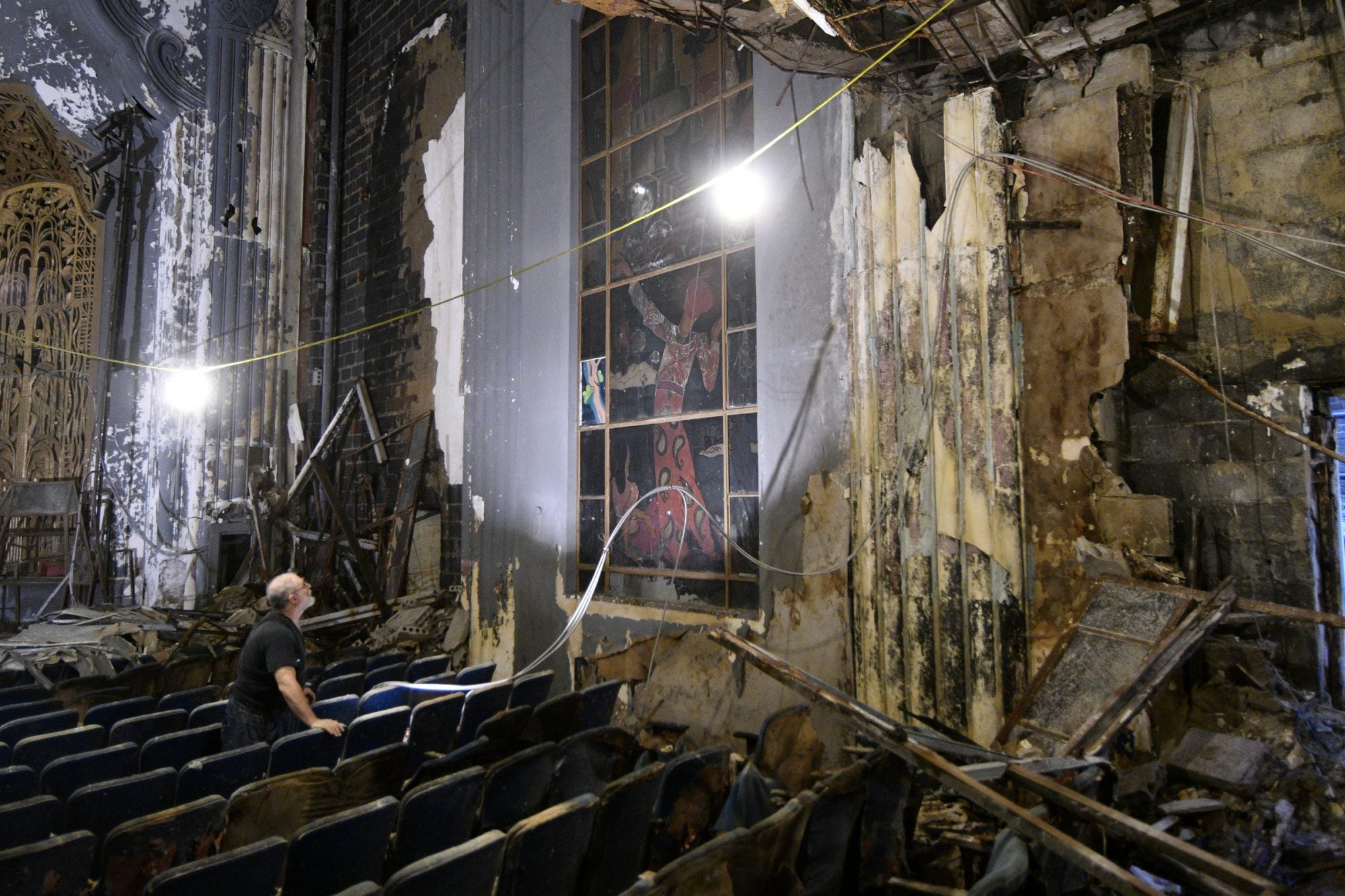
Richardson said many people who visited the theater last year during Free Streets returned on Saturday.
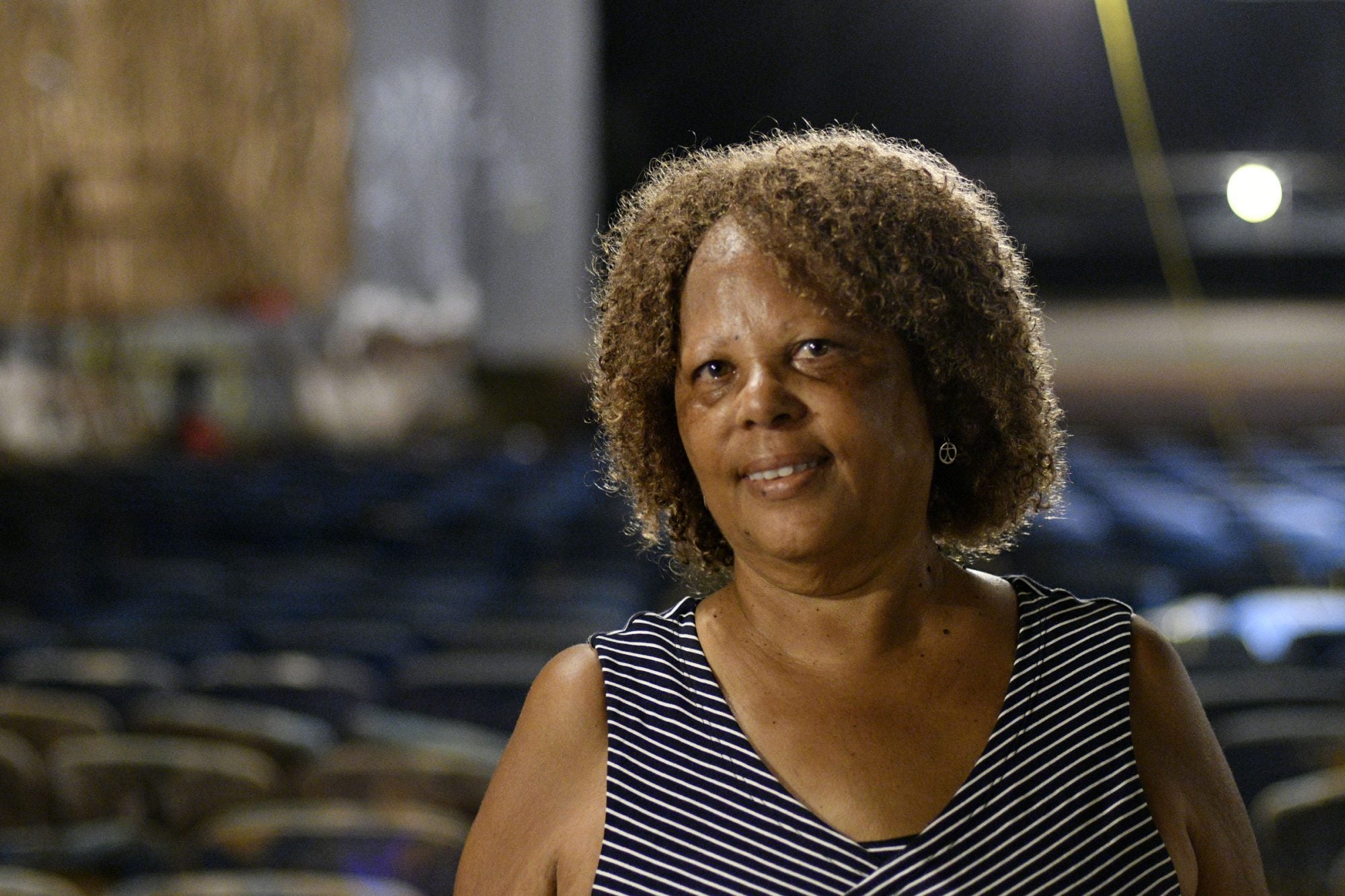
“Hopefully we have some new people, new residents and old residents, who have never been, say, north of City Hall to see some of the things that are going on,” Richardson said.
New growth at North Philly community garden
About six blocks North, neighbors took to a stage at Broad and Diamond streets and performed “The Electric Slide.” The dance coincided with the grand reopening of the Sonia Sanchez and James Burgess Renaissance Garden at Diamond and Carlisle streets.
The North Central Philadelphia CDC hosted the celebration — which brought out Philly’s first poet laureate — and the namesake of the garden — Sonia Sanchez herself.
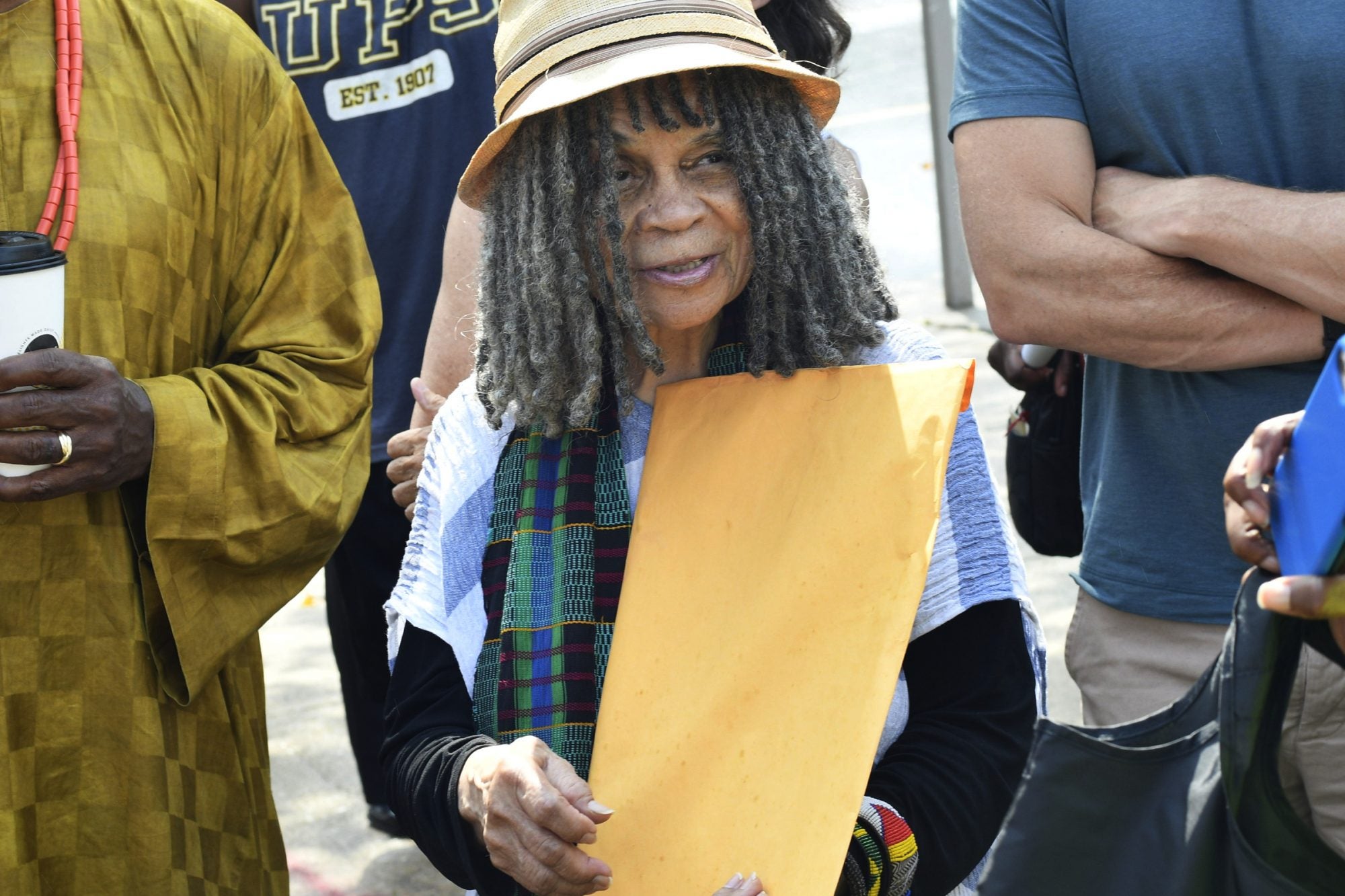
The garden sits on a small plot of land and has been often overlooked, said Tinamarie Russell, the CDC’s president.
During a summer youth work program, the CDC discovered most of the young people participating didn’t know who Sonia Sanchez was, and after doing a neighborhood survey, discovered most people didn’t know either.
The CDC decided to redesign the garden to make it more noticeable by moving the entrance, replacing its tall, chain-link fence with a shorter, wooden one, and creating new raised planter beds.
The group also plans to build a stage in front of the mural of Sanchez, where poets can perform in the garden.

For Russell, hosting this important community event during Free Streets helps promote the CDC’s work.
“I love Philly Free Streets because it allows us to communicate with people. So many people came through today where we would have never met them and they would have never met us,” Russell said.
WHYY is your source for fact-based, in-depth journalism and information. As a nonprofit organization, we rely on financial support from readers like you. Please give today.


